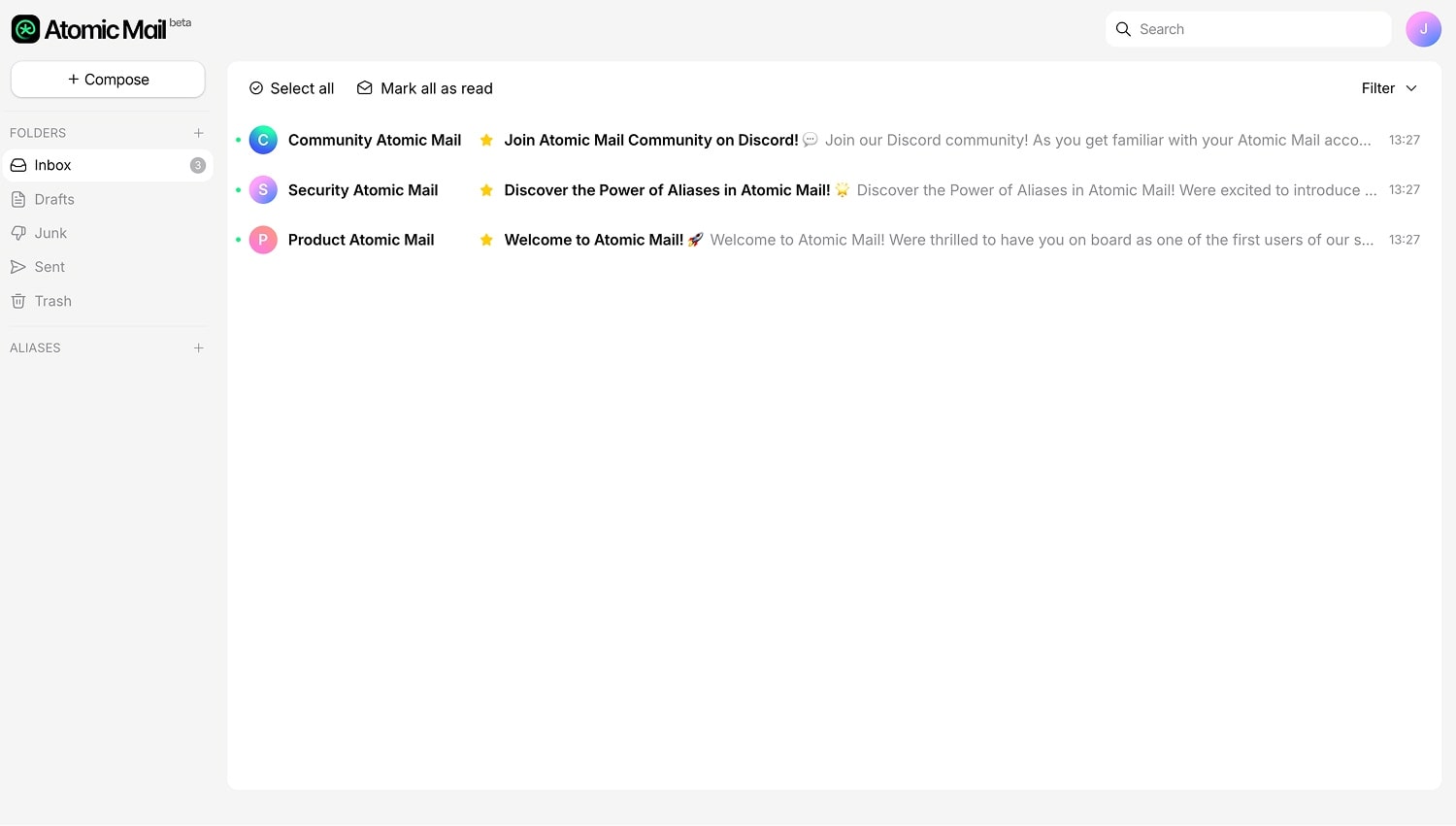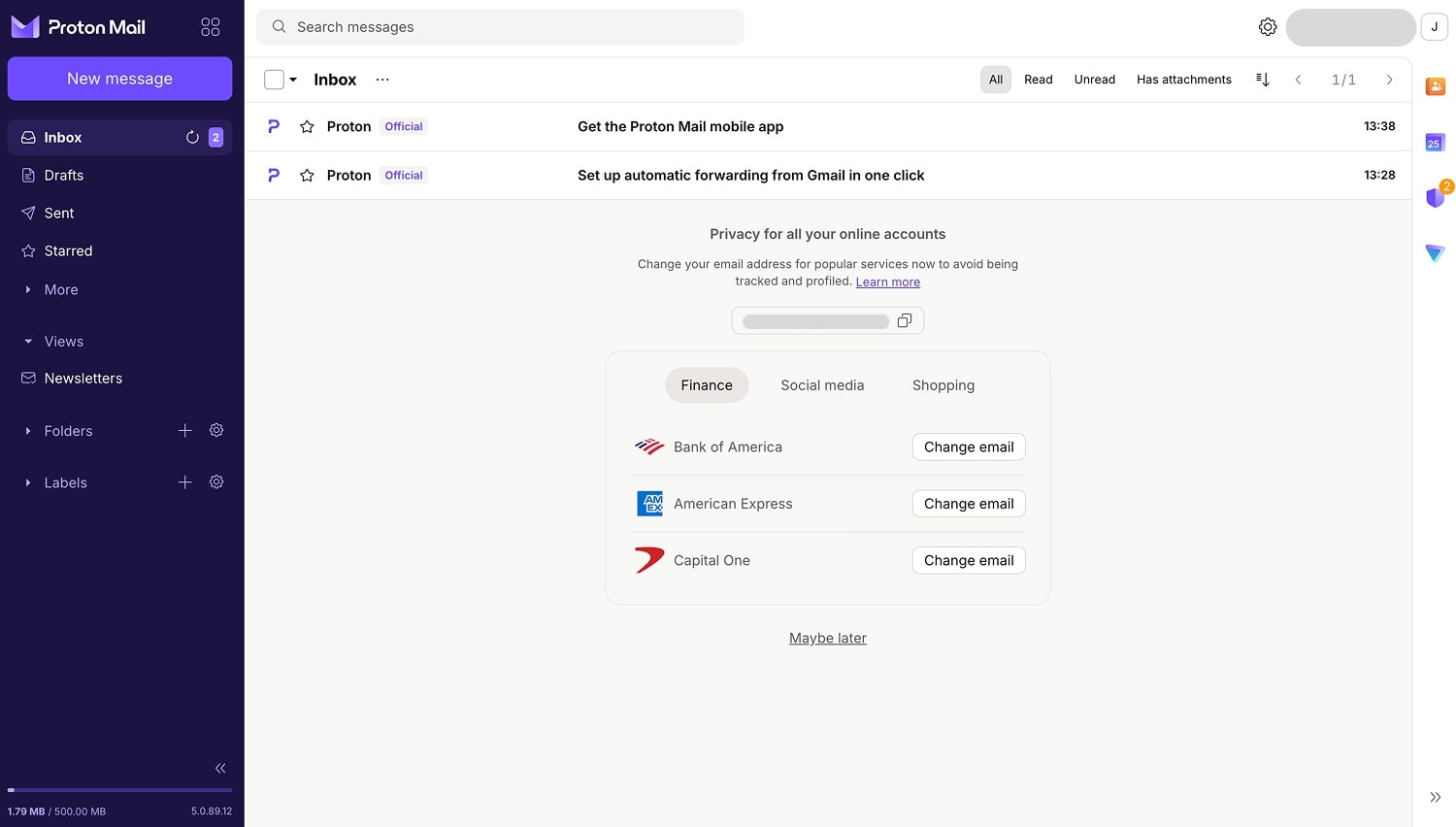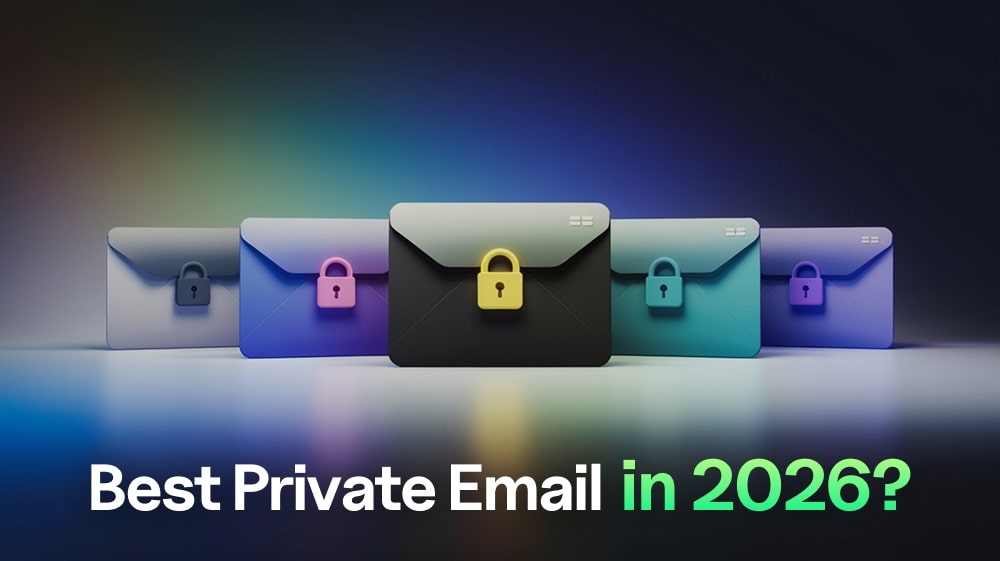Your email account is much more than just a chat platform – it's the main key to your entire digital life. From tax returns and flight tickets to medical records and password resets to social media, all your important personal info is stored in that inbox. For years, we’ve handed over that master key to Big Tech companies in exchange for convenience.
However, moving into 2026, the cost of that convenience has become too high. The digital threat landscape has changed, and sticking with a standard 'free but convenient' account leaves you vulnerable in ways that weren't a concern five years ago. Finding the best private email provider is no longer paranoia – it's a necessary part of keeping your digital life safe.
- The rise of AI surveillance and data tracking: Now, AI tools can create hyper-realistic phishing attacks that standard filters miss, and more people believe in. At the same time, more services integrate AI directly into your inbox and train their models on users’ data. Put together, this creates a much bigger attack surface than most people realize.
- How Big Tech monetizes your inbox: With traditional email, your activity, contacts, and behavior can feed into ad systems and profiling, helping companies learn what you buy, what you read, and what you care about. Even if you never see a creepy ad, that data trail still exists and keeps growing as you use their services.
- Real-world privacy breaches: Large breaches aren’t theoretical – they’ve already exposed billions of email accounts over the last decade. When an email provider stores huge amounts of private user data in one place, it becomes a very attractive target. If that data is poorly protected or not properly encrypted, names, addresses, passwords, and private messages can all end up in someone else’s hands.
That’s why more people and businesses are looking seriously at private email providers. Here we help you find the best private email services to protect your conversations in 2026 and beyond.
What Makes an Email Truly Private?
Let’s first define what a private email provider should look like.
A logo that says “secure” doesn’t tell you much. When you’re deciding which option could be the best private email provider for you, it helps to look at the underlying ideas and not just the feature checklist.
Here are the big pieces that matter:
- Real end-to-end encryption, not just TLS: TLS protects messages while they travel between servers. That’s good, but your provider can still read everything once it arrives. With proper end-to-end encryption, only you and the recipient hold the keys. Even if someone forces access to the servers, they shouldn’t be able to read your emails.
- Zero-access architecture: The best private email account isn’t one where you “trust” the company not to peek, it’s one where they technically can’t. Zero-access designs mean the provider never has the keys needed to decrypt your mailbox in the first place.
- No ads, scanning, or tracking: If a provider is funded by ads, it has a huge incentive to analyze your behavior. The best private email services earn money from subscriptions or paid upgrades, not from turning inbox activity into an ad profile.
- Minimal sign-up info needed (and no phone number): If you are forced to share your phone number or another email address, your identity becomes tied to the account, which opens the door to SIM swaps and recovery abuse. Services that respect your privacy ask for as little personal data as possible (ideally just a username and password, plus a secure recovery method that you control).
- Thoughtful recovery, not backdoors: Traditional recovery (backup email, SMS) is convenient but risky. Modern private email providers increasingly use recovery phrases or other user-controlled methods so there isn’t a standing backdoor into your account.
- Transparent tech and location: Documentation, security whitepapers, and clear jurisdiction all matter. The service you choose should be open about where your data lives and how it’s protected.
When a provider checks all of these boxes, you’re using a tool that’s actually designed to keep you off the data-harvesting radar.
Top 5 Private Email Providers in 2026
We’ve analyzed the top private email providers based on encryption, zero-access policies, user experience, and security features. Here’s our list of the top contenders for 2026.
Now let’s dive into the details.
1. Atomic Mail

Founded in 2024 by a team of cybersecurity experts and privacy advocates, Atomic Mail is a young but very ambitious private email provider based in the EU. It’s designed to be a full replacement for Gmail or Outlook, but with strong encryption, zero-access architecture, and a surprisingly generous free plan. The idea behind the project is simple: make private encrypted email accessible to everyone – regardless of location, technical skill, budget, or other factors.
As a recently launched service, Atomic Mail is in an active development phase, frequently rolling out new features from its roadmap and user suggestions. In less than a year, Atomic Mail passed the 1-million-user mark and built a vocal, privacy-minded community around it. That pace of growth and iteration gives Atomic Mail a realistic shot at catching up with, and eventually overtaking, many long-established providers in terms of both features and day-to-day usability.
Features
- End-to-end encryption (E2EE) for emails and attachments
- Unique encryption technology – Atomic Encryption
- Password-protected messages to non-Atomic recipients
- Zero-access encryption
- Up to 10 free aliases in a free plan (expanded in paid plans)
- Private AI email assistant (writing, summarizing, translating, text ⇆ voice conversion, security helper)
- No ads, trackers, or email scanning
- Expiring messages
- Unlimited free storage
- Fully anonymous email
- Private seed phrase recovery system
🇪🇪 Jurisdiction: Estonia
🇩🇪 Servers Location: Germany
💸 Price: Free plan. Paid plans will be announced soon.
Pros
- Free plan available
- Generous free plan with more value compared to competitors
- Easy-to-use end-to-end encryption with no extra setup needed
- No personal data required for signup
- ISO 27001 certified data centres
- Use of the latest security technologies
- Focus on sustainable infrastructure (powered by renewable energy)
- Unlimited free storage sets it apart from competitors
- Standalone apps for all major platforms
Cons
- New provider with a smaller track record and ecosystem
- Some advanced features are still in beta or under active development
- Full business plan is still in development
If you don’t need an “all-in-one workspace” immediately and can wait until more advanced features become available, Atomic Mail is one of the best private email options right now. It offers top-tier encryption, real data control and a modern experience at an affordable price.
2. Proton Mail

Proton Mail is one of the most well-known private email providers on the market. Founded in 2013 by a group of scientists and engineers at CERN, it has grown from a privacy-focused email service into a broader ecosystem comprising Mail, VPN, Drive, Calendar and Pass. For many users, it is the first point of comparison when looking for the best private email service.
Features
- End-to-end encryption for emails and attachments
- Password-protected messages to non-Proton recipients
- Zero-access encryption
- Support for custom domains and multiple addresses on Paid plans
- No ads, trackers, or email scanning
- Ecosystem integration (VPN, Calendar, Drive, etc.)
- Email aliases (paid plans)
- Expiring messages
- Private AI writing assistant (drafting and summarizing)
- Cryptocurrency payment support
🇨🇭 Jurisdiction: Switzerland
🇨🇭 Servers Location: Switzerland
💸 Price: Free plan with many limitations, paid plans starting at $4.99/month or $47.88/year.
Read the full Proton Mail review: features, plans, prices, usability & more.
Pros
- Long track record and large user base
- Feature-rich apps on all major platforms
- Free plan available
- Core cryptographic libraries are open source
- Easy-to-use interface for all skill levels
- Good fit if you want an all-in-one privacy suite, not just email
Cons
- Very limited free plan
- Only 1 free email account available
- Many flexibility features require premium plans
- Expensive paid plans
- Instances of logging user IP addresses
If you want a mature, all-in-one privacy suite with mail, VPN, storage, and more under one roof, Proton is a good and reliable choice. However, if Proton Mail’s pricing or philosophy doesn’t quite fit for you, we recommend exploring a Proton Mail alternative.
3. Tuta (formerly Tutanota)

Tuta, previously known as Tutanota, is a German provider that’s been in the privacy space since 2011. Tuta especially focuses on encryption depth. In 2024, they are the first major provider to implement "post-quantum" cryptography (TutaCrypt), protecting users' data against future supercomputers. Also, unlike most competitors, Tuta encrypts everything, including subject lines and calendar event details, ensuring that metadata remains hidden as well.
Features
- End-to-end encryption for emails, contacts, and calendars
- Zero-access encryption
- Metadata encryption
- Post-quantum encryption protocol (TutaCrypt)
- Custom domain support (paid plans)
- Email aliases (paid plans)
- Focus on sustainable infrastructure (powered by renewable energy)
- No ads or tracking
🇩🇪 Jurisdiction: Germany
🇩🇪 Servers Location: Germany
💸 Price: Free plan available, paid plans starting at €3.60/month or €36/year
Pros
- Full metadata encryption
- Client code is open source
- Affordable pricing plans
- ISO 27001-certified data centers
- First to offer post-quantum security to the masses
Cons
- Free plan is very limitated
- Not available for free business use
- Only 1 free email account available
- Free accounts are deleted automatically after 6 months of inactivity
- Outdated interface
- No support for free users
- Potential delays with account approval
Despite its strong security model, Tuta’s very limited free plan and old-fashioned UI can be a real barrier for everyday use. In that case, checking out a Tuta Mail alternative can help you find something equally private but far more comfortable to use.
4. StartMail

StartMail is a privacy-focused email service from the Netherlands, launched in 2013 by the creators of the private search engine Startpage. It’s aimed at people and small teams who want a hosted, encrypted inbox with their own domain, unlimited aliases, and no ads or tracking, but don’t want to run their own mail server.
Features
- End-to-end encryption (E2EE) for emails and attachments
- Unlimited email aliases
- No ads, tracking, or data mining
- Custom domain support for businesses
- Expiring messages
🇳🇱 Jurisdiction: Netherlands
🇳🇱 Servers Location: Netherlands
💸 Price: No free plan, paid plans starting at $6,99/month or $59,88/year
Pros
- Unlimited email aliases
- Easy to navigate and use
- 7-day free trial available
Cons
- No free plan available
- No native mobile or desktop applications
- Payment details required upfront for free trial
- Expensive paid plans
- Storage is capped at 20-30 GB even in paid plans
- Membership in the 9 Eyes alliance might be a concern for some privacy-conscious users
StartMail is a business-friendly service with strong privacy fundamentals, but the lack of a free tier and the limits on its paid plans (including storage and apps) often push people to look for a StartMail alternative that offers more flexibility for the same or lower cost.
5. Mailfence

Mailfence is a Belgium-based secure email suite. Developed by ContactOffice Group, it offers encrypted email, a calendar, contacts, document storage and groups, making it a great option for small teams or families looking to de-Google their workflow. Mailfence also plays nicely with standard email protocols, allowing you to use it with your favourite tools, like Thunderbird or Apple Mail.
Features
- End-to-end encryption (E2EE) for emails and attachments
- Built-in calendar, contacts, and cloud storage
- No ads, tracking, or email scanning
- Custom domain support for business users (paid plans)
🇧🇪 Jurisdiction: Belgium
🇧🇪 Servers Location: Belgium
💸 Price: Free plan with limited functionality, paid plans starting at $2.75/month (billed yearly)
Pros
- Integrated suite of tools
- Affordable pricing and per-user management
- Mobile apps for iOS and Android
Cons
- Very limited features on the free plan
- Mobile apps lack some features compared to the desktop interface
- Outdated interface
- Requires user setup for encryption (not automatic like many competitors)
- No dedicated desktop application
Mailfence is a good option if you like the built-in suite of tools, but if its plans feel too limited and you’d prefer a smoother, more modern email client, we recommend switching to a Mailfence alternative that better matches your expectations.
Choosing the Best Private Email for Your Needs
The best private email provider for you depends on your . Here is a quick breakdown to help you decide.
1. Casual users: “I just want a safer inbox”
If you want to de-Google your life and stop ad tracking, don't overcomplicate it. You need a balance of security and everyday convenience.
What to look for:
- Simple apps on web + mobile (no geeky setup)
- Generous free plan (enough storage + aliases)
- Automatic encryption that “just works” in the background
- No ads, no tracking, clear privacy policy
For most casual users, the best private email account is the one that feels as easy as Gmail, but with enhanced privacy and no spying on you.
✅ Top picks: Atomic Mail (generous free plan); Proton Mail (ecosystem).
2. Businesses & teams: “Complete safety of corporate and client data”
If you handle client contracts, financial info, legal docs, or internal strategy, you need professional tools that comply with regulations like GDPR. Admin and account management are also helpful tools.
What to look for:
- Custom domains (you@yourcompany.com)
- Admin panel for managing users and roles
- Strong security (encryption + anti-phishing)
- Compliance readiness (GDPR, clear policies, data handling transparency)
- Reliable support and uptime guarantees
- Optional “workspace” tools: calendar, contacts, documents, shared mailboxes
✅ Top picks: Proton Mail (business plans + suite), Mailfence (email + productivity suite), StartMail (business plan + unlimited aliases)
3. High-risk users: crypto, journalists, activists, etc.
If your safety, identity, or financial assets depend on anonymity, convenience comes second. Prioritize maximum protection, minimal data exposure, and a provider with a strong security posture.
What to look for:
- Strong end-to-end + zero-access encryption
- Minimal or no personal data at signup (no phone number, no additional emails)
- Support for aliases / hide-my-email addresses
- Seed phrase recovery (so no admin can reset your password)
- Privacy-friendly jurisdiction (outside of the "14 Eyes" or even "9 Eyes" )
✅ Top picks: Atomic Mail (fully anonymous signup + modern E2EE options), Tuta (modern encryption + metadata protection).
Final Verdict: What Is the Best Private Email Provider In 2026?
After reviewing the top private email providers, one service stands out as the most complete option for most people in 2026: Atomic Mail. Whether you’re a privacy-conscious everyday user, a business owner protecting client data, or someone securing high-value accounts, Atomic Mail offers a strong mix of security, usability, and anonymity – without putting the best features behind an expensive paywall.
The ultimate all-in-one private email solution: Atomic Mail
Atomic Mail is setting a new standard for what a private email provider should look like in 2026. It combines the strongest available encryption with a user experience that feels modern and effortless.
Here is why it wins:
- End-to-end encryption that works in real life – advanced E2EE options for Atomic-to-Atomic messages and easy encryption choices for external recipients.
- Zero-access encryption so even the provider can’t read your end-to-end encrypted messages or storage.
- Self-destructing emails so sensitive conversations don’t hang around forever
- Email aliases to separate sign-ups, work, banking, and everything else.
- Anonymous signup (no phone number, no personal details required).
- Seed phrase recovery so only you control account recovery, not a phone carrier or a “backup email”.
- Modern, user-friendly interface that doesn’t feel like a niche security tool.
- Native apps for major platforms so you can use it anywhere.
- A rich free plan – including unlimited storage for everyone.
- Fast-moving product development with new features and plans rolling out regularly as the infrastructure expands.
If you’re ready to stop treating email privacy as a “nice-to-have” and want a service that’s secure and easy to use, Atomic Mail is the strongest pick in 2026.
Create your free account and switch to private email that’s actually built to protect you.
✳️ Sign up for Atomic Mail Now 🔒



